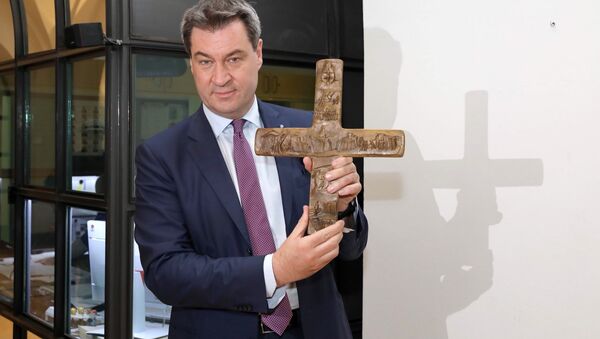The new decree “Kreuzpflicht,” or the Crucifix obligation, involving the hanging of crosses in public buildings, has come into force in Bavaria after two months of debates and criticism. Several categories of establishments, such as universities, museums and theaters, have been exempted, although they are still recommended to follow the rule. The order doesn’t apply to the offices of the federal authorities in Bavaria. There are no directions concerning the design or size of the crosses, neither are there any control measures or sanctions.
The Bavarian government accepted the regulation in April, which was suggested by state head Markus Soeder from the Christian Social Union, who put a cross in the State chancellery himself. According to him, the initiative was a "clear avowal of our Bavarian identity and Christian values." He had gone to Rome to visit Pope Francis and his predecessor, Benedict XVI. The former pope endorsed the move, which received mixed reactions back in Germany.
After Munich Cardinal Reinhard Marx had warned against a political “hijacking” of the religious symbol, some church people and bishops opposed the stance, according to “ZS.”
The Social democrats (SPD), who oppose the CSU, demanded that Soeder admit that the decree was a mistake, and call it off. Bavarian SPD leader Natascha Kohnen has accused him of exploiting it as an election maneuver ahead of the state elections scheduled for June. In her interview with "Augsburger Allgemeine" she said, "This outraged me, like many other Christians."
The decision has been criticized in the scientific and artistic communities. The president of the Bavarian Academy of Fine Arts, Michael Krüger, told the German outlet Sueddeutsche Zeitung: "We have nothing against crosses of whatever kind, only they should hang where they belong: in the church."
Online reactions were also split. Some applauded the move online, lambasting double standards involving questions of religious identity.
Religious tolerance only applies to Islam and Judaism?
— David Murphy (@DavidMu47226392) 1 июня 2018 г.
So? Western puppet governments are imposing muslim prayer rooms on our supposedly secular institutions. Where's the faux outrage on this one?
— Doomsday Pepper (@PepperDoomsday) 1 июня 2018 г.
@Markus_Soeder definitely a good move to promote & honor culture, #Bavaria #Germany https://t.co/RQ3qQpegKO … Germany: Bavaria's controversial cross rule goes into effect
— Minar Aliyar (@MinarAliyar) 1 июня 2018 г.
Bravo. The crosses should be visible. Mosques have minarets which are visible!
— YOSEMITE SAM (@PANTHER12616352) 31 мая 2018 г.
Others pointed out that hanging only crosses divides the society.
What does Bavaria think adding crucifixes everywhere will actually accomplish? Muslims aren't monsters you can just scare away with the cross. It just looks like a knee jerk reaction from the religious right, particularly considering the law isnt backed by the church
— 🐕Bark-Eye Camera🐕 (@FatdogMalin) 31 мая 2018 г.
Why does a crucifix need to be on a driving license office? How is that “natural”? Bavaria is full of churches. What purpose does a cross on the tax office serve except to assert an exclusionary and divisive message aimed (currently) mostly at Muslims, but also at Jews. https://t.co/E93JLpx1XH
— Ali Abunimah (@AliAbunimah) 1 июня 2018 г.
The number of Catholics and Protestants in Germany sank to a new low in 2016, with the latter hemorrhaging almost 1.6 percent of its members in comparison with the previous year. According to the Gesis Institute in Leibniz, 66 percent of Germans are Christians (both Catholic and Protestant), while this percentage exceeds 80 percent in the most populated German state of Bayern. Preserving Germany’s cultural and religious identity has been in the focus of painful questions brought up in public discussions amid the migrant crisis, which has been unfolding since 2015. Following the announcement of the “open borders policy,” Germany has accepted more than 1 million migrants from the Middle East and Northern Africa, which has increased the size of the Muslim community in the country.
READ MORE: Seehofer's 'Islam Doesn't Belong to Germany' Remark Shakes the Country
While the coalition government has been repeatedly criticized for how it has dealt with the crisis, integrating newcomers into German society, the Alternative for Germany party, which has advocated a stronger stance on migration, has steadily been gaining political support.
This trend has shown itself in Bavaria, too. Although the state, known for its independent stance on inner politics, has long been a stronghold of the conservative wing of Angela Merkel’s CDU, the CSU has been losing its supporters to the Alternative for Germany. Recent polls show that the CSU lost electoral support by 7 percent, scoring 41, while the AfD received 12 percent.
The AfD, which made a tougher stance on migration one of the cornerstones of its campaign, landed a historic result during the 2017 German parliamentary elections as it came in third and entered the Bundestag. Before that the CSU had been considered the most conservative representation in the German Parliament, especially compared to Angela Merkel’s more centrist Christian Democratic Union.


